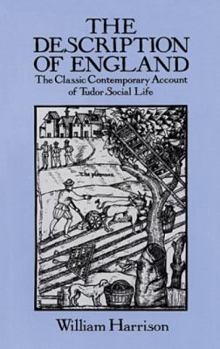The Description of England: The Classic Contemporary Account of Tudor Social Life
..". for when our houses were builded of willow, then had we oaken men; but now that our houses are come to be made of oak, our men are not only become willow but a great many, through Persian... This description may be from another edition of this product.
Format:Paperback
Language:English
ISBN:0486282759
ISBN13:9780486282756
Release Date:November 2011
Publisher:Dover Publications
Length:560 Pages
Weight:0.10 lbs.
Dimensions:1.1" x 5.4" x 8.6"
Related Subjects
16th Century Education & Reference England Europe History Ireland Modern (16th-21st Centuries) WorldCustomer Reviews
1 rating
Smorgasbord of delights
Published by Thriftbooks.com User , 19 years ago
This is a wonderful account of life in Renaissance England by someone who was actually there, a quite worldly clergyman named William Harrison, who is opinionated and often comically pedantic. Did you know that England has more "idle servingmen" than any other nation on earth, who "otherwise would be brought to labor and live in order like subjects. Of their whoredoms I will not speak anything at all, more than of their swearing, yet it is found that some of them do make the first a chief pillar of the building, consuming not only the goods but also the health and welfare of many honest gentlemen, citizens, wealthy yeomen, etc. by such unlawful dealings" (119). Not many people know that "If the philosopher's stone were once found, and one part hereof mixed with forty of molten glass," we would have glasses that would never break, but bounce right off a stone floor (128). Did you know that clergy and religious men have the strongest wines (130)? Harrison also includes detailed instructions for making your own beer, starting with raw grain. In the olden days of England, accused malefactors were subject to a trial by fire or water. In the trial by fire, you were forced to walk over iron ploughshares heated red hot, "whosoever did bear or tread upon the same without hurt of his body, he was adjudged guiltless; otherwise, if his skin was scorched, he was forthwith condemned guilty" (168). Most people think that "idle vagabonds" are simply an disordered rabble, but in Renaissance England they were actually a highly organized hierarchy consisting of Rufflers, Uprightmen, Hookers or Anglers, Rogues, Wild Rogues, Priggers of Prancers, Palliards, Fraters, Abrams, Fresh-water mariners or whipjacks, Dummerers, Drunken Tinkers, Swadders or Peddlers, Jarkmen or Patricoes; Women Vagabonds were classified as Demanders for glimmer or fire, Bawdy Baskets, Morts, Autem Morts, Walking Morts, Doxies, Dells, Kinchin Morts, and Kinchin Coes. Harrison provides definitions of all of the above. "Players" or actors were also classified as vagabonds during this time period. For serious crimes, malefactors were taken from "the prison to the place of execution upon an hurdle or sled, where they are hanged till they be half dead and then taken down and quartered alive; after that, their members (genitals) and bowels are cut from their bodies and thrown into a fire provided near-hand and within their own sight. Sometimes, if the trespass be not the more heinous, they are suffered to hang till they be quite dead." According to Harrison, everything in England is going to hell in a hand basket in these newfangled modern days, "for when our houses were builded of willow, then had we oaken men; but now that our houses are come to be made of oak, our men are not only become willow but a great many, through Persian delicacy crept in among us, altogether of straw, which is a sore alteration" (276). Everybody is trying to get rich and etc. etc. Nevertheless, according to Harr






